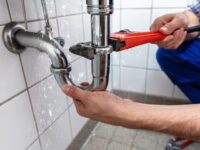When Your Home’s Plumbing Goes Haywire
When your home’s plumbing goes haywire, you must call the pros at Plumber Woodland Hills. Otherwise, your house could turn into a swimming pool.
But how do you know if the situation is an emergency? Here are some tips to help you decide:
Drains handle all the water and waste that flows into and out of your home, so it’s natural for them to clog up from time to time. If you’re experiencing slow-moving or backed-up drains, a simple plunging might clear the problem. However, more serious clogs require professional drain cleaning tools to resolve.
If you’ve already tried plunging and household drain cleaning products with no luck, it’s time to call an emergency plumber. Clogs that are left unaddressed can cause sewer backups or force sewage into your home. The good news is that most minor clogs are easy for plumbing professionals to fix.
A drain clog typically forms when food, hair, soap scum, grease, and other debris stick to the sides of pipes. As the clog grows, it creates pressure that prevents water and waste from flowing through the pipe. In some cases, a clog can become so severe that the entire pipe is blocked.
While some clogs occur in the kitchen or bathroom, most are caused by a buildup of waste materials in the home’s main sewer line. This can cause drains throughout the house to stop working or flow slowly.
A major clog usually takes months or years to develop and requires specialized tools to remove. The first step is to remove the P-trap under a sink (make sure you have a bucket underneath). After that, use a snake — a long spring with a corkscrew end — to feed into the drain until you feel it hit an obstruction and then hook the clog up for removal. Then, flush the pipe with hot water. For longer clogs, you can also try using a drain auger. These are similar to snakes but are more powerful, longer, and feature more aggressive tips.
Burst Pipes
A burst pipe can turn a relaxing evening with the family into a water disaster in your home or business. In the worst-case scenario, it can even result in serious structural damage and water damage to your belongings.
Burst pipes typically occur because of changes in temperature that cause the water to expand inside the pipes. They can also be caused by a buildup of corrosion over time, especially if the pipes are made of metal or have been in service for a long period of time. Whatever the cause, it’s vital to understand how these pipes burst and take preventative steps to reduce your risk of this problem.
One of the first things to do when a pipe bursts is to shut off the main water supply. This will stop any new water from entering the system and minimise damage until a plumber is available. This valve is usually located at the water meter or where the main line enters your house. You should also turn off the electricity in the area of the leak, to avoid high voltage shocks for anyone who wades through the water.
There are many indicators of a burst pipe, including large puddles, water noises in walls or ceilings, clangs or rattles from the pipes hitting each other and electrical sounds such as buzzing or clicking. Those who have experience dealing with plumbing issues will know what to look for and can quickly find the source of the problem. There are also some quick temporary fixes that can be done to limit the damage until a plumber can get there. These can include putting a piece of rubber, wood and a clamp over the pipe to keep it together for the short term.
Sewage Backflow
Sewage backflow isn’t just messy; it’s dangerous, too. The bacteria-laden wastewater that flows through your pipes can cause serious illness. In some cases, a sewer backflow will send the dirty water right into your home through floor drains. If you suspect backflow, it’s important to contact a licensed plumber immediately.
There are a few different things that can lead to sewer backflow, including a blockage in your city sanitary main. This is a common problem during big storms, when water levels in the pipes rise too high. If you have a sewer backflow preventer installed, this can help prevent this issue.
However, it’s also important to note that a sewer backup can occur due to problems with your own plumbing system. This is particularly true if you have a clogged drain or a physical obstruction in the line. You can prevent these issues by regularly having your sewer lines cleaned and by avoiding flushing items that can cause a blockage, like sanitary products, baby wipes, cigarette butts, and paper towels.
A blocked sewer line will create a backflow of sewage into your home. This can be extremely dangerous for you and your family and will result in extensive damage to your home. It is best to call a professional as soon as you notice the signs of a backup, such as slow-moving drains or gurgling noises from your toilets.
In addition, make sure to protect yourself by wearing rubber gloves and a face mask when cleaning any affected areas of your home. It’s also essential to use a non-contaminated water supply while doing so. You can also prevent sewage backflow by having your backflow preventer tested on a regular basis.
Faulty Shut-Off
One of the best ways to prevent plumbing disasters such as flooding and raw sewage is by shutting off your water supply. Every home should have a main shut off valve to cut off the water in an emergency, as well as individual valves located near sinks, toilets, and the water heater. It is important to check these valves regularly and replace them if needed.
However, many shut off valves can get stuck and not turn at all. If you have a valve that won’t budge, it can cause water damage to your house or apartment and may require the help of an emergency plumber.
It’s common for homeowners to shut off their water if they are going on vacation in the winter, so the pipes won’t freeze and burst. Unfortunately, they forget that there is still water between the spigot and the shut off valve that can freeze and cause a pipe to burst right next to the shut off valve. This won’t be noticed until the home is turned back on, and this can lead to serious leaks.
If your shut off valve is getting stuck, the first thing to do is to try and rock it back and forth or use a wrench to loosen it. If it doesn’t budge, try spraying some penetrating oil on the valve stem. Let it sit for a few hours and then try again to see if you can loosen or open the valve. It’s also a good idea to spray the valve with lubricant periodically to keep it in working condition. This will avoid the need to call an emergency plumber for a small job that could have been avoided by simply lubricating the valve.
Water Heater
The water heater is a major appliance in the home that provides hot water for washing, showering and cooking. It is a relatively complex unit that has several components, including the burner assembly that ignites natural gas to heat the water; control valves managing flow rate and temperature inside the tank; and a thermocouple acting as a safety device shutting off the gas supply if the pilot light goes out. Problems with the water heater can be dangerous and should be fixed by a qualified emergency plumber.
A clogged drain or broken pipe is one of the most common reasons to call a plumber, but there are other emergencies that require immediate attention. If your toilets overflow, you have a significant leak in the ceiling or walls, or you see pools of sewage water in your yard, these are signs of serious problems that need to be addressed immediately by an emergency plumber.
If you suspect a gas leak, the most important thing to do is shut off your main gas line at the meter. If you aren’t sure how to do this, call the gas company or 911 before calling a plumber. Gas leaks are extremely dangerous and should be treated as a serious emergency.
When you’re in a pinch, it can be tempting to hire the first emergency plumber that answers your call. However, taking the time to shop around for a pro can save you money and stress in the long run. If possible, request a quote over the phone from three plumbers to compare prices and services. Also, ask for references from past customers and check out online reviews. Once you’ve found a quality plumber, keep their number on hand so that you can quickly call them when an emergency arises.




